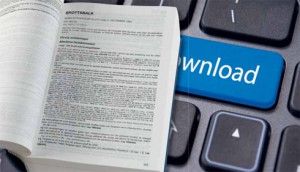 Fifteen years ago, online peer-to-peer file-sharing was a fairly straightforward process. One simply downloaded a file-sharing client such as Kazaa, searched for whatever tickled one’s fancy, and waited for the file to transfer.
Fifteen years ago, online peer-to-peer file-sharing was a fairly straightforward process. One simply downloaded a file-sharing client such as Kazaa, searched for whatever tickled one’s fancy, and waited for the file to transfer.
While it was undoubtedly easy, slick it was not. ‘Shared folder’ type applications like Kazaa and LimeWire were slow, clumsy and a haven for fake files and junk. No wonder people got excited when BitTorrent came along a few years later.
Today, people getting into the P2P file-sharing scene experience an altogether different dynamic. In some ways it’s more difficult to get going from a standing start, but for those prepared to handle an initially steep learning curve the rewards are potentially much greater.
However, with great ‘rewards’ come great responsibilities, especially when it comes to sharing copyrighted content without permission. As a result there are many misconceptions about what is and isn’t legal and how people are ‘caught’ (and by whom) when using tools such as BitTorrent online.
I never ‘seed’ so I’m never going to get caught
For the vast majority of users, seeding is the act of sharing content they have already downloaded. So, when a movie has downloaded and clicks from 99% to 100% complete, their BitTorrent software starts sharing that entire copy with the world.
However, many users believe that if they stop their software before it starts seeding, that means they cannot be tracked by anti-piracy companies. Unfortunately for them, that is completely untrue.
Any user in a BitTorrent ‘swarm’ has the potential to be tracked, often within seconds and certainly within minutes of beginning their download. This is because unless there are special circumstances, all users are also automatically sharing the content they’re downloading with others.
Once that user’s IP address has been logged by an anti-piracy company, few give a damn whether the user is sharing 100% or 0.1% of a movie. While the time spent in a swarm increases the chances of being monitored, for anti-piracy companies participation is guilt – period.
I own the original DVD/CD so I can download a copy completely legally
So you went into the city and picked up a copy of Mission Impossible – Rogue Nation and helped to push the movie to the top of the Blu-ray charts. Then, having enjoyed it so much, you bought the soundtrack on CD from Amazon. Pat yourself on the back – you’re a paid-up member of the legitimate purchase club.
With that accolade under your belt, it must then follow that you can download backup copies from BitTorrent in case of scratches etc, right?
Err, no. Absolutely not.
Buying an original copy of a movie or CD provides the purchaser with a license to use that content in a certain fashion, usually including viewing/listening at home in front of a limited number of people. What that license definitely does not provide is permission to mass distribute that content to anyone else.
As noted above in the ‘seeding myth’ section, anyone downloading content from BitTorrent is almost always distributing (or uploading) the same content to other users in the same swarm. The act of uploading is illegal in most countries.
Put plainly, anti-piracy companies couldn’t give a damn whether uploaders own none, one, or a million copies of the content in question. Unauthorized mass distribution is illegal, period.
How can I stop my ISP from spying on me?
During the past several years many hundreds of thousands of file-sharers have received letters or emails advising them that they’ve been monitored sharing copyrighted content without permission. As detailed above, many participated in BitTorrent swarms and had their IP addresses logged.
However, since the correspondence they initially receive usually comes from their Internet service provider (Comcast in the US, or Sky in the UK, for example), people believe that their ISP has been spying on them. That is simply not true.
In all ordinary circumstances, especially involving file-sharers, ISPs have no interest in monitoring their users. Not only would this present a legal minefield for service providers, doing so would also represent a logistical nightmare.
To be clear, anti-piracy companies monitor pirates and, broadly speaking, ISPs would rather not know what their users are doing. Some like to throttle (slow down) BitTorrent users but their interest generally ends there.
I only need to use a VPN to avoid being traced
There can be little doubt that buying a decent VPN from a reputable company is one of the best things anyone can do to protect their online privacy. However, people should be aware that this is only one aspect of remaining anonymous and it does not allow them to act with impunity.
Very often it is not merely how people connect to the Internet (unprotected IP address) that causes them to breach their security, but what they say and do once they’re online. For anyone interested in reading more about how poor Internet hygiene can drive a bus and several trucks through VPN security, please refer to our earlier article detailing how the UK’s most prolific pirates were caught.
In summary, VPNs are great (some might argue ‘essential’) for maintaining privacy online and their use alone will stop casual monitors from tracking the user. However, for those taking the bigger risks, VPNs and similar technology only help when sheer carelessness is taken out of the equation.
Source: TorrentFreak, for the latest info on copyright, file-sharing, torrent sites and ANONYMOUS VPN services.
Source: TorrentFreak




 Following a three year investigation by Hollywood-backed anti-piracy group the Federation Against Copyright Theft (FACT), in December five of the UK’s most prolific movie pirates were sentenced to more than 17 years.
Following a three year investigation by Hollywood-backed anti-piracy group the Federation Against Copyright Theft (FACT), in December five of the UK’s most prolific movie pirates were sentenced to more than 17 years.








 At the start of the new year the TF news desk often wonders how things can become even more extreme than the year before.
At the start of the new year the TF news desk often wonders how things can become even more extreme than the year before. 